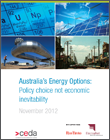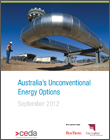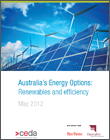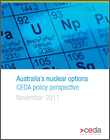PROGRESS 2050: Toward a prosperous future for all Australians
CEDA's major research project for 2011-12, Australia's Energy Options, explores a range of issues in the energy space. Three policy perspectives have been released so far, including: Australia's nuclear options, Renewables and efficiency and Australia's Unconventional Energy Options.
The final report in the research series, Policy choice not economic inevitability, was released on 14 November 2012 in Sydney and includes a range of policy recommendations for the energy sector.
Downloadable resources
AUSTRALIA'S NUCLEAR OPTIONS RENEWABLES AND EFFICIENCY AUSTRALIA'S UNCONVENTIONAL ENERGY OPTIONSPolicy perspectives
The first policy perspective in the series was Australia's Nuclear Options, released on 10 November 2011. It explores nuclear technology and its capacity to assist in meeting Australia's energy requirements in a carbon constrained environment.
The second policy perspective, Renewables and efficiency, released on 15 May 2012, discusses options for assessing the viability of renewables, possible energy sector models to increase efficiency and policy options for renewables.
The third policy perspectives, Australia's Unconventional Energy Options, released on 3 September 2012 in Brisbane, examines the economic opportunities unconventional energy presents in Australia. This policy perspective explores and makes policy recommendations on water management, the current regulatory regime for unconventional energy sources, property rights issues between landowners and mining companies, and the critical lessons that Australia can learn from the unconventional energy developments in the US.
 |  |  |  |
| Australia's Energy Options: Policy choice not economic inevitability November 2012 |
ADDITIONAL CHAPTER RELEASED:
The contribution of monopoly network service providers to electricity price rises in the National Electricity Market.
By Carbon Market Economics (CME), Director, Bruce Mountain
